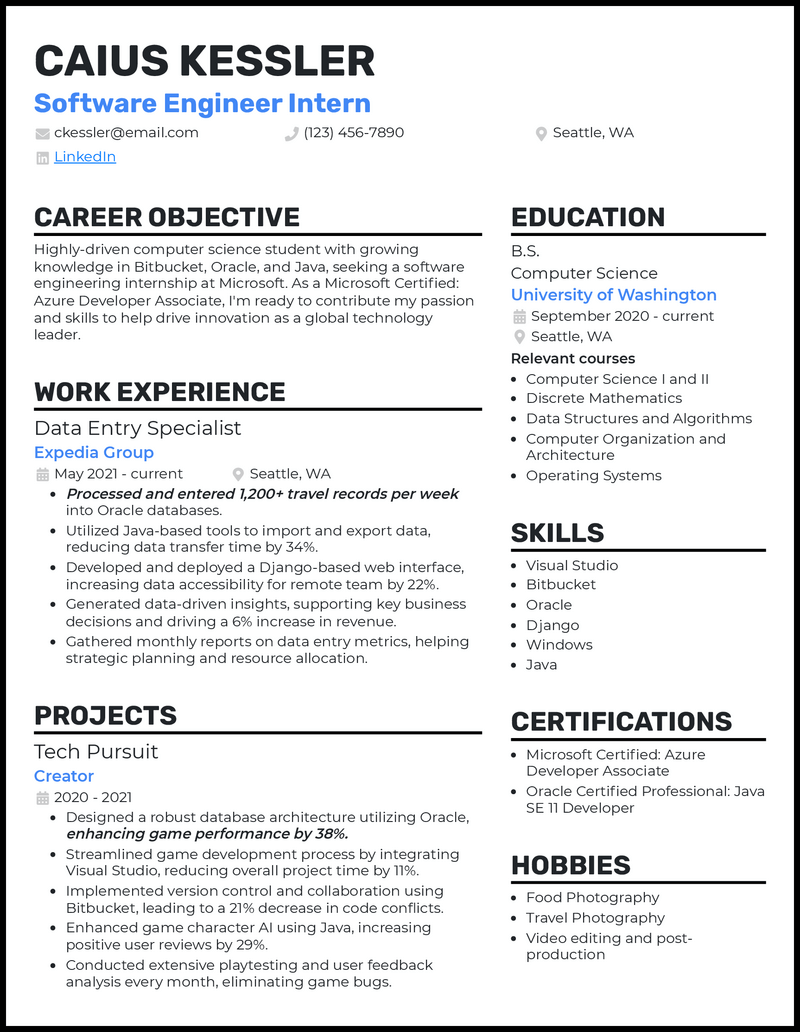Caius’ computer science courses might have given him an excellent foundation for his dream job in software engineering . . . but he hadn’t learned nearly as much about resume development as he had about software development! Luckily, he stumbled upon these resume examples, giving him a valuable starting point.
After learning to spotlight his best qualifications, Caius wrote a career objective to outline some technical skills that demonstrated his readiness for an internship at Microsoft. Let’s just say that after he followed our guidelines to create his software engineer intern resume and make a cover letter, you just might benefit from his contributions during your PC’s next software update!
Whether you’re looking to join a massive company like Microsoft or eager to contribute to a startup that’ll feed your hunger for software engineering and advancement, try our sleek resume templates to land yourself the perfect internship!
Why this resume works
- Still green and pursuing your degree? Don’t sweat it. Your software engineer intern resume can become miles better with a good set of projects.
- But remember, potential employers are going to be more concerned with your impacts than the actual work. Craft your points to highlight marginal changes you made with phrases like “improved system performance by X” instead of “troubleshot X system.”
Learn how to
land a job
Get the free 4-day email course for college students and recent grads.
What Matters Most: Your Programming Skills & Experience

In the fast-paced world of software engineering, your skills are your greatest assets. Be it hands-on coding, debugging, testing, or participating in code reviews, you’ve been honing these skills for a while now, so it’s important to make the most of them in your resume.
You might be tempted to show that you’re a quick learner and an eager collaborator. Both are important in this role, but you’re better off emphasizing your technical skills instead.
Use this section to highlight the programming languages you know. It’s okay if you’ve not mastered them just yet, but you should feel comfortable using them on a daily basis.
9 best software engineer intern skills
- Java
- Python
- JavaScript
- Visual Studio Code
- Algorithms
- SQL
- Azure
- NoSQL
- Git
Sample software engineer intern work experience bullet points
Recruiters care about your skills, but they often prefer knowing how you manage to put them into action.
It doesn’t matter if you’ve already had a taste of on-the-job software engineering—the projects you’ve worked on are important regardless. This can mean college courses or other internships. However, don’t overlook self-made projects.
Think about your greatest accomplishments and what you were already able to make with your programming language of choice. Next, add some quantifiable metrics to make them “pop.”
For example, if you’ve written something like “worked on a Java project,” elaborate on it to explain what that entails and the impact that you had. If you rephrase it to “collaborated with a team of 5 students to develop, test, and debug a Java application, contributing over 300 lines of code over a 2-month period,” it will immediately capture more interest.
Here’s how you can do this on your resume:
- Utilized Java-based tools to import and export data, reducing data transfer time by 34%
- Developed and deployed a Django-based web interface, increasing data accessibility for remote teams by 22%
- Planned and developed an automated script in Python that improved software testing efficiency by 14%
- Contributed to an open-source project using Angular and React, adding over 1,000 lines of code over a 3-month period
Top 5 Tips for Your Software Engineer Intern Resume
- Master your key skills
- Even if you’re applying for an internship, you might be asked to go through a technical interview. To handle it with confidence, only fill your resume with things you know well. For example, if you’ve only just started learning Java but you’re proficient in Python, leave Java at the bottom of your skills list to not give the impression that you’re a pro at it.
- Target transferable skills
- If you have work experience in roles that don’t involve programming, you can still include it if it’s somewhat relevant to the job. For example, if you’ve worked with data entry, QA, software testing, or even just led a coding club at your college, there’s plenty of overlap.
- Never re-use your resume
- Some software engineer internships are highly competitive, so make sure you always make a resume to match the job. Read the job description and include the skills it asks for if you possess them, and if you include a career objective, tie it to the company you’re applying to.
- Build a portfolio
- If you don’t have a portfolio yet, building one will help you stand out. It’s an extension of your resume, so all the same rules apply, but you should fill it up with your projects, be it websites, mobile apps, scripts, or programs.
- Add your certifications
- Certifications often aren’t necessary, but they can help, so add them if you have any. This can include Microsoft Certified: Azure Fundamentals, OCAJP, Google Associate Cloud Engineer, or AWS Certified Cloud Practitioner.
If your past roles aren’t relevant, it’s better to focus on the programming projects you’ve contributed to. However, you can mention them during the interview to show that you’re not new to the professional world.
It can be a useful tool if you feel your resume is looking a little empty, but only if you make it relevant to the company you’re applying to. Update it for each internship.
The most important sections for a software engineer intern resume are skills, work experience, and education. Certifications come in handy too. Skip your hobbies unless they’re relevant, such as robotics or even programming itself.










